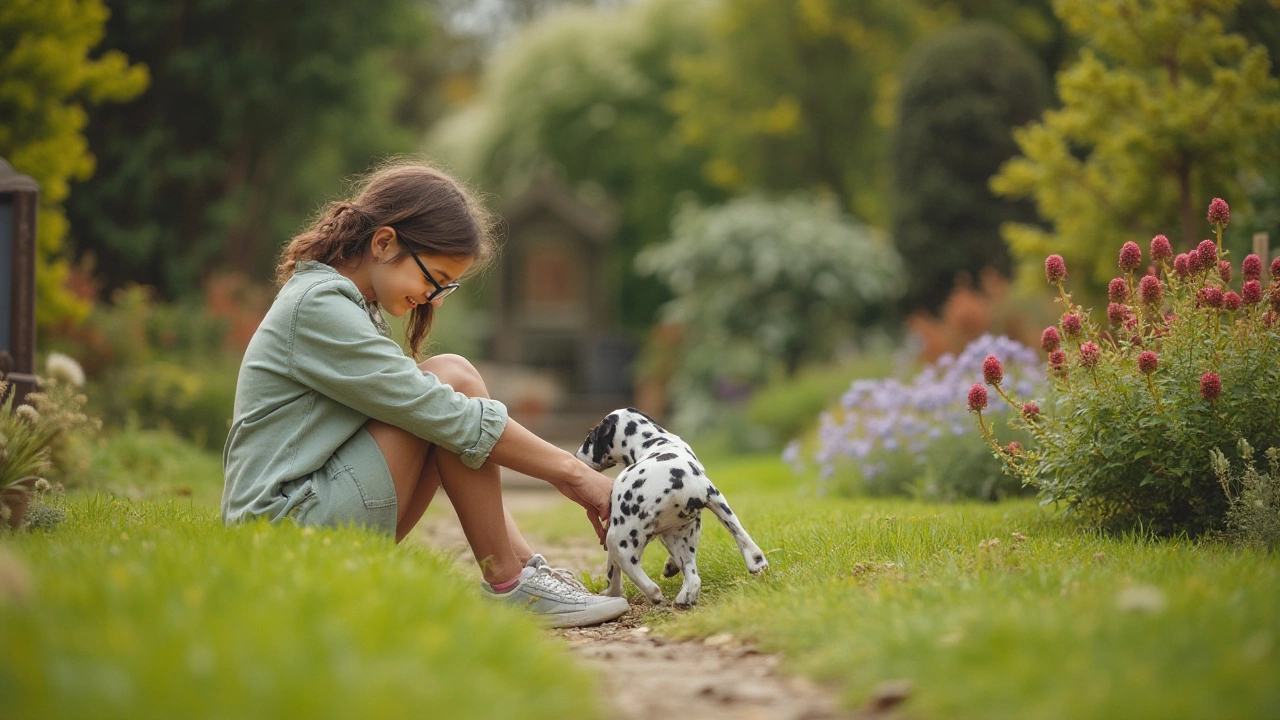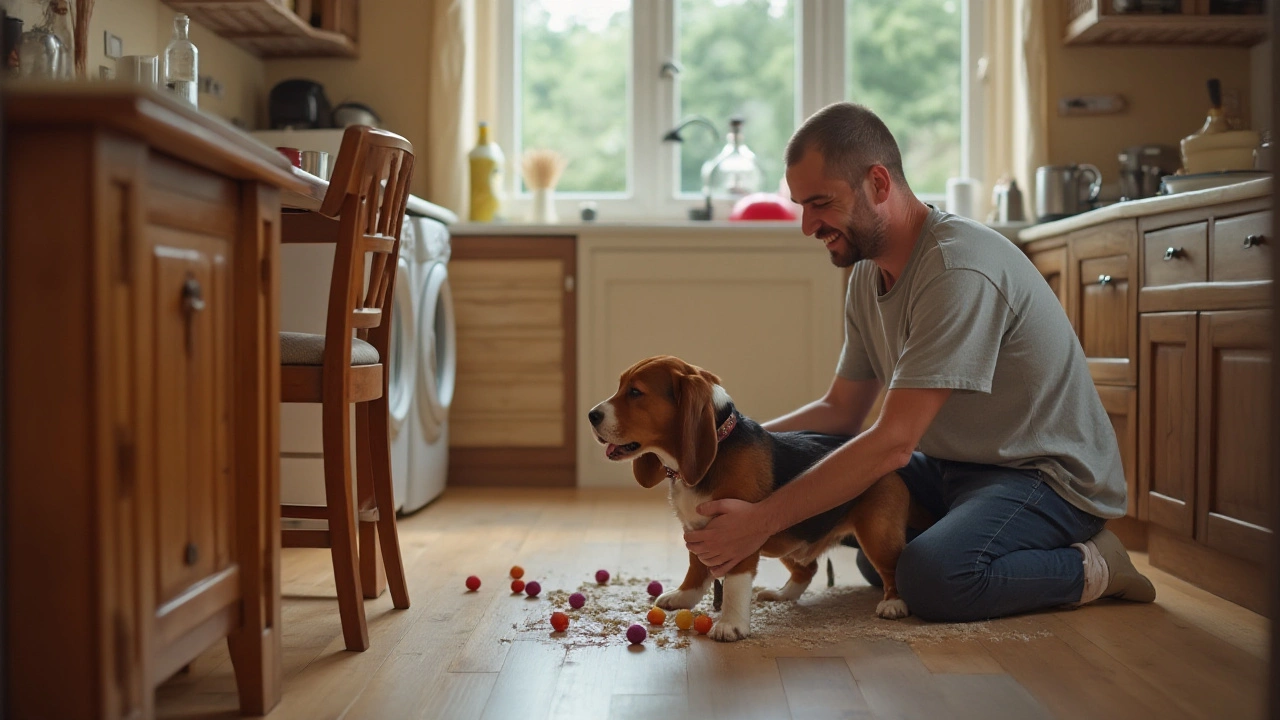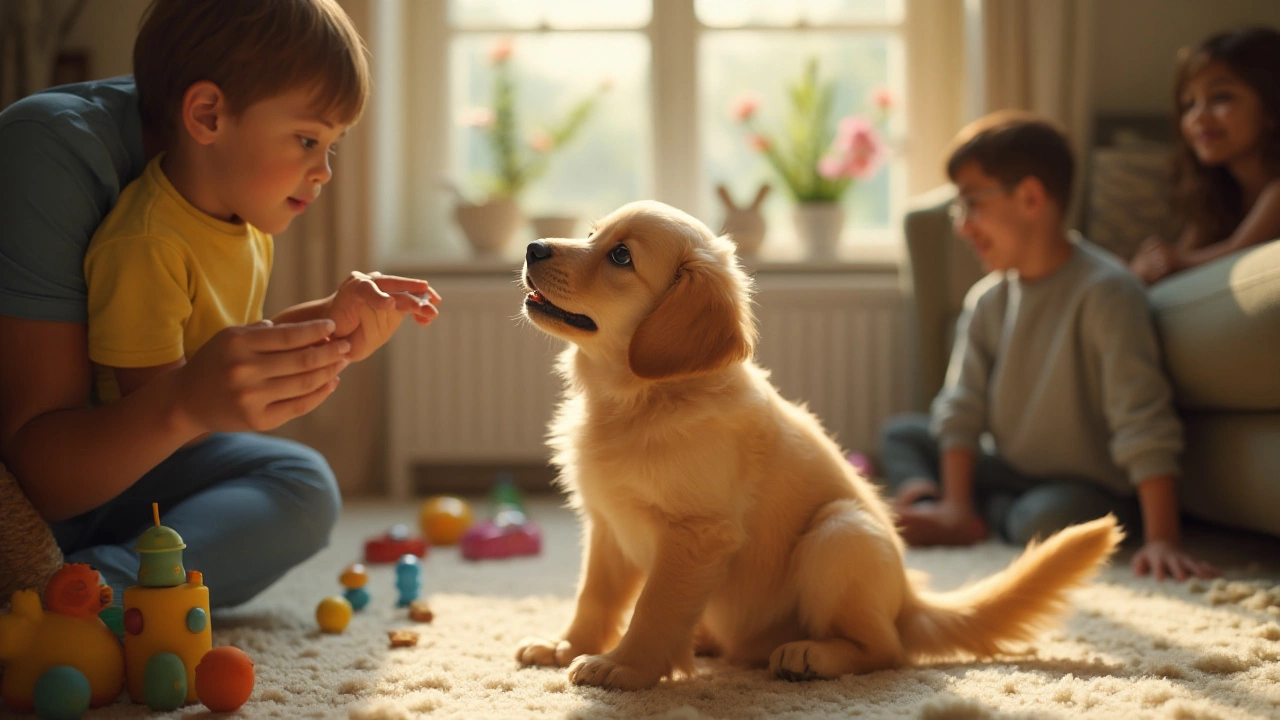Bringing a new puppy into your home is an exciting adventure, filled with cuddles, playtime, and yes, a bit of cleanup. One of the first tasks at hand is housebreaking your furry new family member, a process that varies depending on the breed, individual dog, and environment.
As you embark on this journey, it's important to stay informed and be patient. Understanding how long this process might take and familiarizing yourself with the strategies that can help will make the path smoother for both you and your puppy. Whether you're a first-time puppy parent or a seasoned pet owner, equipping yourself with the right knowledge can make all the difference.
- Understanding the Housebreaking Timeline
- Key Factors Affecting Training Duration
- Proven Strategies for Successful Housebreaking
- Common Challenges and How to Overcome Them
- Maintaining Success: Tips for Long-term Habits
Understanding the Housebreaking Timeline
Embarking on the journey of housebreaking your new puppy is a milestone that many pet owners eagerly anticipate, yet it can often feel daunting. The timeline for housebreaking a puppy doesn't fit one neat schedule—it changes based on several factors, each contributing to your pet's unique learning curve. Generally, puppies may take anywhere from a few weeks to several months to grasp the concept of potty training. On average, expecting the process to take around four to six months can be realistic, although some pups may learn faster, and others may require a bit more time.
Age plays a pivotal role in the expected timeline. Puppies, typically brought home at about eight weeks old, have limited bladder control. Think of a toddler, just learning, exploring, and making messes as part of their natural inclination. Thus, it is essential to set realistic expectations, as younger puppies will take frequent potty trips—sometimes even hourly. Breeds known for their intelligence and eagerness, like Border Collies or Poodles, might advance more quickly, while others might take longer to build consistent habits.
One crucial element of housebreaking is establishing a consistent routine. Dogs are creatures of habit, and your new puppy is no different. Regularity fosters understanding, allowing your puppy to comprehend which behaviors are expected. Keeping a close eye on feeding times, walking schedules, and potty breaks helps create predictability, which puppies need to thrive. A predictable routine offers a sense of security and aids in instilling discipline. Experts often advise introducing your pup to the same potty spot repeatedly. 'Consistency is key when housebreaking a puppy,' notes renowned animal behaviorist, Dr. Jane Goodall. 'Predictable actions lead to predictable reactions.'
Some pet owners find it useful to track the housebreaking progress through challenges and triumphs. Consider creating a chart or diary noting each success and mistake—tracking both time and circumstances. This practice not only offers a visual representation of development but can reveal patterns to fine-tune your approach. Although, be patient; even the most systematic methods can encounter unexpected setbacks. Puppies may regress for various reasons, including changes in environment or stress. Understanding these hiccups as part of a larger learning curve rather than failures ensures you're more prepared and less discouraged.
While the housebreaking timeline varies, involving family members can widen your support network. Each member helps reinforce desired habits, bringing consistency in commands and methods used. Every little step forward, celebrated collectively, reinforces learning and enhances your relationship with your puppy. Positive reinforcement is also vital, a cherished tool in your training arsenal. Recognizing achievements, no matter how minor, motivates your dog and strengthens desired behavior. The magic of treats and affection can make a significant impact, turning potentially stressful situations into cherished bonding experiences for you both. Remember always to approach challenges with patience, love, and understanding.
Key Factors Affecting Training Duration
The journey towards having a fully housebroken dog is not the same for every pet owner. One of the main aspects to consider is the unique personality and characteristics of your puppy. Different breeds often have different levels of intelligence, eagerness to please, and sensibility, which can significantly shape the housebreaking training pace. Breeds known for their sharp wit and attention to commands, such as the Border Collie, tend to learn new tasks swiftly. On the other hand, more independent breeds might require a bit more time and creativity in your training sessions.
The age of your dog when you start training can also alter the length of the process. Puppies are quite adaptable and eager to learn, but very young pups might not have sufficient bladder control until they reach a certain age. Generally, by three months, pups should have the physical capacity to hold their urge for about as many hours as they are months old. A six-month-old, for example, might manage a six-hour interval. It's important to keep this development timeline in mind so you can manage your expectations accordingly.
Another key influence is the environment in which you are training your puppy. Puppies in stable and stress-free homes typically adjust faster compared to those constantly dealing with changes or chaos. Consistency in their surroundings helps them get settled into a routine quicker. A regular schedule for meals, potty breaks, and sleep can work wonders in reinforcing habits. This predictability helps your pup understand what is expected from them.
According to a study published in the Journal of Veterinary Behavior, "consistency and routine significantly improve the success rate of training regimens in domestic dogs." Indeed, sticking to a fixed schedule creates cues that help dogs know when it's time to play, rest, or take a toilet break.
Social factors can influence how efficiently a dog is housebroken. Puppies naturally learn by observing, so having other well-trained dogs around can serve as excellent role models. They can pick up on what is acceptable and will often mimic behavior, effectively shortening the training cycle. On the flip side, if other pets aren't housebroken, it might complicate matters.
In addition, your guidance style makes a significant difference. Using positive reinforcement, like treats, praise, and extra playtime to reward good behavior, motivates your dog to repeat the desired actions more enthusiastically. Conversely, harsh corrections or an inconsistent response can lead to confusion and setbacks in their learning.

Proven Strategies for Successful Housebreaking
Housebreaking a puppy is not just a routine chore; it's an adventure in learning and understanding the world from your dog's perspective. The journey to achieving a well-trained pup hinges on a combination of consistency, observation, patience, and a few tried-and-true strategies. One of the key elements of successful housebreaking is developing a robust schedule that reflects your pet's natural rhythms. Puppies thrive on routine, and by establishing a regular timetable for meals, bathroom breaks, and playtime, you align your expectations with their instincts.
Start by feeding your puppy at the same times every day, as this predictability helps regulate their potty schedule. Directly after eating, guide your puppy to their designated potty area, ensuring you reward them with praise or a small treat when they do their business. Positive reinforcement is crucial—it teaches them that going outside is both safe and rewarding. During the first few weeks, setting a timer to remind you to take them out every hour can make a significant difference as they learn to control their bladder. Remember that just like children, puppies have small bladders and need regular breaks. Observe your puppy closely for signals indicating it's time for a bathroom break; these can include sniffing around, circling, or becoming unusually still.
Create a Positive Environment
The environment in which you conduct puppy training plays a massive role in how swiftly they grasp the housebreaking process. Designate a specific bathroom spot in your yard and always return your puppy there while training. Over time, your puppy will associate this scent-marked area with comfort and business. Keep this area easily accessible and pleasant, avoiding locations that might frighten or distract them.
Nighttime can be among the trickiest aspects to navigate. Consider utilizing a crate or a small, confined space for overnight stays. Most puppies will instinctually avoid soiling their sleeping area, making crates an invaluable tool during potty training. Always remember to take them outside last thing at night and first thing in the morning to reinforce good habits.
"Patience, not punishment, is the cornerstone of effective puppy housebreaking," says renowned animal behaviorist Dr. Jane Pierce, emphasizing the importance of creating a nurturing environment.
Being alert to your puppy's signals and managing the training environment facilitates a stress-free and successful housebreaking experience. Tailoring these strategies to fit your puppy’s unique personality will solidify not just their habits, but also the bond between you and your loyal companion.
Track Your Progress
To effectively measure how well your puppy is adapting to the housebreaking routine, consider keeping a training journal. Note the specific times they eat, drink, and go to the bathroom. By doing so, you’ll gather information about their patterns and identify any areas that might need adjustment. This data can be precious in understanding their biological clock and making necessary changes to the routine.
- Feed your puppy at consistent times to help predict bathroom breaks.
- Take them out every hour at first, gradually increasing the time as they learn.
- Use positive reinforcement to encourage outdoor pottying.
- Utilize crates to encourage nighttime control.
- Observe and act on your puppy's instinctive signals.
Remember, each dog is different, so what works for one may not work for another. The secret lies in observing and adjusting to their individual needs. With patience, love, and these dog care strategies, you'll navigate the housebreaking phase with success and set the foundation for a happy, well-behaved puppy.
Common Challenges and How to Overcome Them
Housebreaking a puppy is often a rewarding, albeit challenging endeavor. It's not uncommon to face some bumps along the journey, often leaving even seasoned dog owners puzzled. Understanding these common challenges and devising strategies to overcome them can make the process less daunting and more manageable. One of the primary difficulties in this task is consistency. Puppies thrive on routine, and a lack of consistent training cues can confuse them about acceptable potty behavior. To tackle this, establish a regular schedule for feeding, playing, and potty breaks. This schedule helps the puppy's body adjust to expected potty times, paving the way for successful training sessions.
Another hurdle many owners encounter is dealing with distractions. Puppies are naturally curious creatures with short attention spans, making it difficult for them to focus during potty training. To mitigate this, choose a quiet area for potty breaks, away from stimulating sights and sounds. This concentration-friendly zone will allow the puppy to focus on the task at hand instead of getting sidetracked by the environment. In addition, some puppies might have accidents in the house even after they seem well-trained. This can happen due to anxiety, suddenly changing routines, or even medical issues.
If accidents do occur, react calmly and without scolding, as negative responses might aggravate the problem. Instead, clean up the mess promptly to remove odors that might invite repeat incidents. Consider incorporating crate training as a supportive tool. When implemented correctly, it can provide a safe haven that encourages your puppy to hold their bladder because dogs innately avoid soiling their sleeping space. Offering praise and tasty treats when your puppy eliminates in the right spot ensures they connect the experience with something positive.
Handling Stubbornness
Dealing with a stubborn pup may seem like running a marathon, but perseverance can yield remarkable results. Certain breeds, due to their individual traits, may show stubbornness when adjusting to housebreaking protocols. In such cases, identify motivators that spark enthusiasm in your pet. Some puppies respond well to 'jackpot rewards', where they receive more lavish praise or a higher value treat than usual when they succeed in the right activity. Remember not to overlook exercise and mental stimulation. A well-exercised pup is more likely to respond positively to training as energy levels are balanced and stress levels are minimized.
“Dogs do speak, but only to those who know how to listen.” — Orhan Pamuk
It's essential to keep your expectations realistic and rely on patience as your ally. Housebreaking is as much about understanding your puppy's needs and personality as it is about discipline and training. With careful observation and consistent efforts, you'll be able to transform what seems like insurmountable challenges into triumphant milestones.

Maintaining Success: Tips for Long-term Habits
Once your puppy seems to have mastered the art of housebreaking, the task is far from finished. Ensuring that these new habits are deeply ingrained takes time and continued commitment. It's all about creating a stable routine that both you and your puppy can stick to. This might mean setting out specific potty times during the day and adhering to this schedule as much as possible. Dogs thrive on routine, and knowing what to expect helps them succeed.
Keeping a clean and consistent environment is equally important. Dogs can make associations with certain scents or areas, sometimes falling back into old habits if they detect anything reminiscent of a previous accident. Regular cleaning of the dog's space, as well as any mishaps that may occur, will help reinforce their training. Being watchful and quick to address lapses is key, but always in a positive and encouraging manner. Remember, your puppy wants to please you.
Positive reinforcement can't be overstated. Every time your dog successfully goes outside or follows the routine, praise and reward are your allies. Rewards don’t necessarily have to be treats; sometimes a favorite toy or a fun game can serve as motivation. Be mindful, however, to taper the rewards gradually, switching from food-based ones to affection and verbal approval. This way, your dog learns that following the house rules is rewarding on its own.
An interesting tidbit about puppy training is that age can make a difference in learning and retaining skills. While younger puppies might pick up new habits quicker due to their developing brains, older dogs often have the advantage of better self-control and a longer attention span. Regardless of the age, maintaining the established routines helps these habits stick, making it easier when other changes come, like moving to a new home or adding a new family member to the pack.
"Training a dog is not about the big leaps, but the small steps taken consistently over time." - Cesar Millan
Keep in mind that unforeseen changes in your dog's environment or routine, such as household members' schedules or living conditions, can sometimes trigger a temporary lapse in behavior. In such cases, patience and consistency become even more vital. Revisit the basics if needed and expect success as you work back toward established behavior patterns.
Lastly, keep track of any health changes or stressors that might be affecting your dog’s habits. Sometimes medical issues, like urinary tract infections, can lead to accidents, which can mistakenly be viewed as training failures. Regular vet visits help ensure that health issues aren't misinterpreting behavioral regression. Understanding and addressing these aspects builds the trust and cooperation that are fundamental to long-term habit success.
